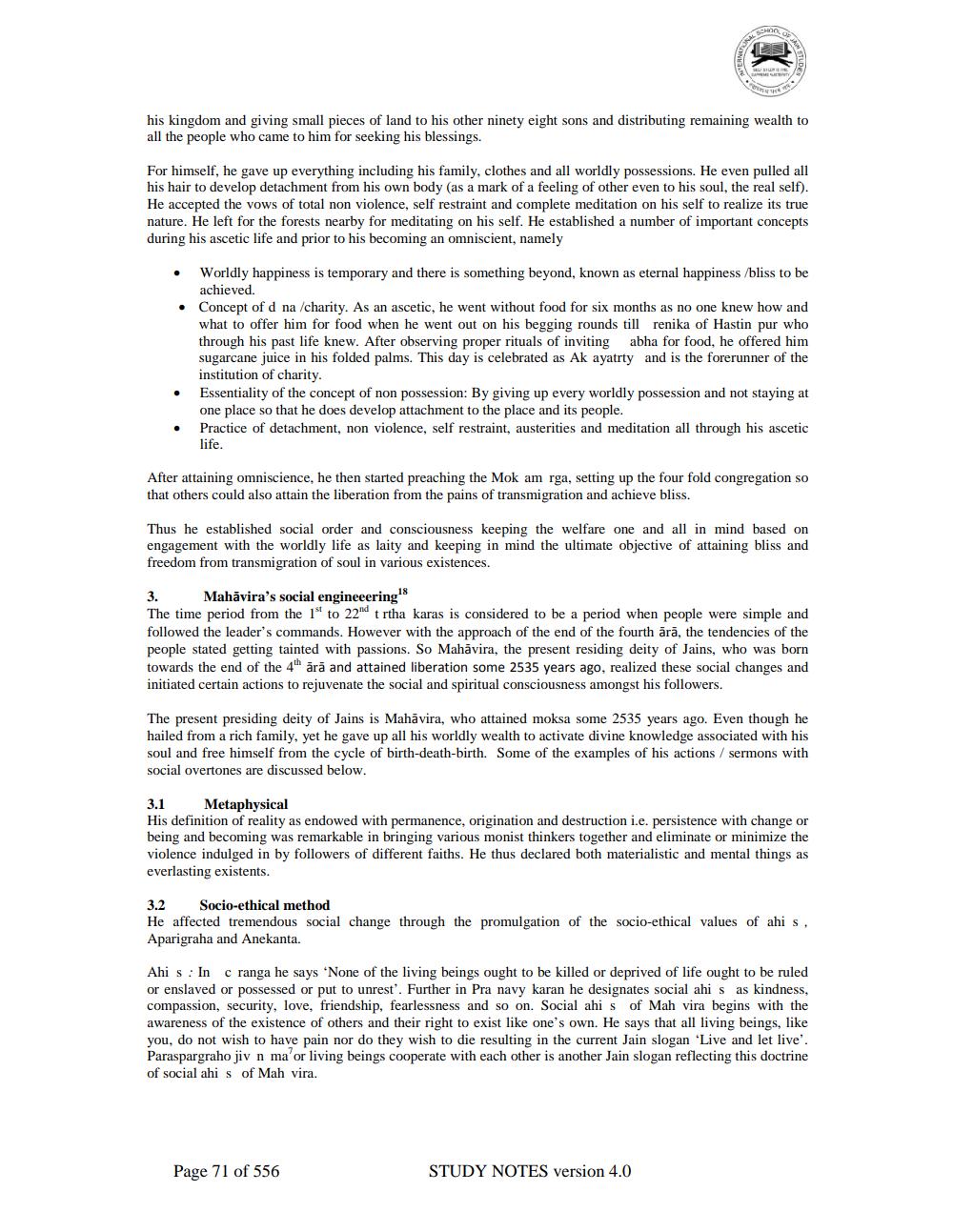________________
his kingdom and giving small pieces of land to his other ninety eight sons and distributing remaining wealth to all the people who came to him for seeking his blessings.
For himself, he gave up everything including his family, clothes and all worldly possessions. He even pulled all his hair to develop detachment from his own body (as a mark of a feeling of other even to his soul, the real self). He accepted the vows of total non violence, self restraint and complete meditation on his self to realize its true nature. He left for the forests nearby for meditating on his self. He established a number of important concepts during his ascetic life and prior to his becoming an omniscient, namely
Worldly happiness is temporary and there is something beyond, known as eternal happiness /bliss to be achieved. Concept of d na /charity. As an ascetic, he went without food for six months as no one knew how and what to offer him for food when he went out on his begging rounds till renika of Hastin pur who through his past life knew. After observing proper rituals of inviting abha for food, he offered him sugarcane juice in his folded palms. This day is celebrated as Ak ayatrty and is the forerunner of the institution of charity. Essentiality of the concept of non possession: By giving up every worldly possession and not staying at one place so that he does develop attachment to the place and its people. Practice of detachment, non violence, self restraint, austerities and meditation all through his ascetic life.
After attaining omniscience, he then started preaching the Mok am rga, setting up the four fold congregation so that others could also attain the liberation from the pains of transmigration and achieve bliss.
Thus he established social order and consciousness keeping the welfare one and all in mind based on engagement with the worldly life as laity and keeping in mind the ultimate objective of attaining bliss and freedom from transmigration of soul in various existences.
3. Mahāvira's social engineeering The time period from the 14 to 224 t rtha karas is considered to be a period when people were simple and followed the leader's commands. However with the approach of the end of the fourth ārā, the tendencies of the people stated getting tainted with passions. So Mahāvira, the present residing deity of Jains, who was born towards the end of the 4" ārā and attained liberation some 2535 years ago, realized these social changes and initiated certain actions to rejuvenate the social and spiritual consciousness amongst his followers.
The present presiding deity of Jains is Mahāvira, who attained moksa some 2535 years ago. Even though he hailed from a rich family, yet he gave up all his worldly wealth to activate divine knowledge associated with his soul and free himself from the cycle of birth-death-birth. Some of the examples of his actions / sermons with social overtones are discussed below.
Metaphysical His definition of reality as endowed with permanence, origination and destruction i.e. persistence with change or being and becoming was remarkable in bringing various monist thinkers together and eliminate or minimize the violence indulged in by followers of different faiths. He thus declared both materialistic and mental things as everlasting existents.
3.2 Socio-ethical method He affected tremendous social change through the promulgation of the socio-ethical values of ahi s, Aparigraha and Anekanta.
Ahi s : In c ranga he says 'None of the living beings ought to be killed or deprived of life ought to be ruled or enslaved or possessed or put to unrest'. Further in Pra navy karan he designates social ahi s as kindness, compassion, security, love, friendship, fearlessness and so on. Social ahi s of Mah vira begins with the awareness of the existence of others and their right to exist like one's own. He says that all living beings, like you, do not wish to have pain nor do they wish to die resulting in the current Jain slogan 'Live and let live'. Paraspargrahojiv n ma'or living beings cooperate with each other is another Jain slogan reflecting this doctrine of social ahi s of Mah vira.
Page 71 of 556
STUDY NOTES version 4.0




